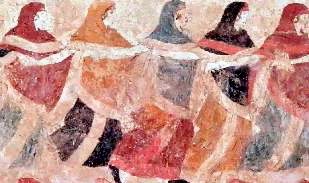We present the ‘Ode to Man’, a lyric chorus from Sophocles’ Antigone. Our aim is to embody words through gestures, rather than to represent or to symbolise them. Here we are influenced by David McNeill’s linguistics of gesture, where gestures (such as the ones I am making even now) are understood to be global concomitants of the articulations of an act of speech. All of the postures we have taken from the vases seem to us to be multivalent, not determinations but embodiments of the sometimes ambiguous meaning of the words and phrases that draw them forth. Consider this one, my favourite, drawn from a geometric urn. It occurs with the words Ἅιδα μόνον: Hades alone man cannot escape, despite all his ingenuity.
Despite what I said about embodiment rather than imitation, do not be surprised if in the course of the movement you see pregnant ocean waves, horses and bulls at the plough, wild animals, birds’ wings and the net that traps them, even a representation of man himself—that is, the cunning male, περιφραδὴς ἀνήρ—by each of our mixed chorus individually.
The chorus ends with a curse upon the criminal—μήτ᾽ ἐμοὶ παρέστιος ... ὃς τάδ᾽ ἔρδει (may he not be at my hearth ... he who does these things)—and the stage is set for Antigone’s entrance under arrest.
